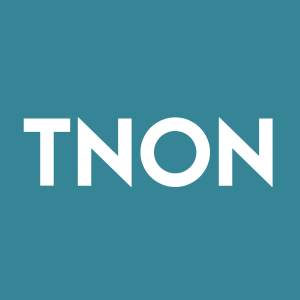Tenon Medical Announces Initial Case Series Utilizing Catamaran(R) SI Joint Fusion System to Enhance Stabilization of the SI Joint for Patients Undergoing Lumbar Fusion
Rhea-AI Summary
Positive
- FDA approval for expanded indication in lumbar fusion procedures expands market opportunity
- Successful completion of initial case series demonstrates clinical viability
- Integration with spinal fusion procedures achieved without adding significant complications or operative time
- System provides additional stability without increasing surgical complexity
Negative
- None.
News Market Reaction – TNON
On the day this news was published, TNON declined 4.47%, reflecting a moderate negative market reaction.
Data tracked by StockTitan Argus on the day of publication.
~ Andrew J. Trontis, MD from Progressive Spine and Orthopaedics, (Englewood, NJ) Completes Initial Case Series ~
LOS GATOS, CA / ACCESS Newswire / June 12, 2025 / Tenon Medical, Inc. (NASDAQ:TNON) ("Tenon" or the "Company"), a company transforming care for patients suffering from certain Sacroiliac Joint (SIJ) disorders, today announced the completion of an initial case series utilizing the Catamaran® SI Joint Fusion System (the "Catamaran") to immobilize & stabilize the SI Joint providing added support at the base of a lumbar or thoracolumbar fusion. The case series was completed by Andrew J. Trontis, MD from Progressive Spine & Orthopaedics in Englewood, New Jersey. As announced previously by the Company, the Catamaran recently received an expanded indication for use from the U.S. Food and Drug Administration (FDA). The Catamaran is now approved to augment immobilization and stabilization of the SI joint for patients undergoing sacropelvic fixation as part of a lumbar fusion.

"As an orthopedic spine surgeon managing complex spinal pathology, I am always looking for innovations that deliver long-term value to my patients," said Andrew J. Trontis, MD. "Integrating Catamaran into spinal fusion constructs has meaningfully enhanced my surgical approach - offering robust stabilization at the base of the fusion without adding significant morbidity, blood loss, or operative time. By securing this foundation early, we can reduce the risk of future sacroiliac joint pain or pelvic instrumentation failure, ultimately supporting more durable outcomes."
"Achieving FDA clearance for Catamaran's use in augmenting spinal fusion has been a pivotal objective for Tenon throughout the system's development," added Steven M. Foster, President and CEO of Tenon Medical. "With our growing clinical experience and emerging data from the MAINSAIL trial, it's evident that we're providing a safe, dependable, and efficient method for authentic SI joint fusion. We believe Catamaran will be a crucial tool in addressing the sacropelvic biomechanical challenges presented during a complex spine surgery."
This expanded indication is poised to open a substantial new market opportunity for the Company by addressing the need for robust SI joint stabilization and fixation as part of complex spinal fusion procedures. The Company remains committed to advancing care for patients with SI joint disorders and is excited about the potential of the expanded Catamaran indication to benefit a broader patient population.
About Tenon Medical, Inc.
Tenon Medical, Inc., a medical device company, is focused on developing and commercializing innovative surgical solutions that provide patients with SIJ disorders with a lasting solution for their pain. The Company has developed a minimally invasive surgical implant system, Catamaran®, that provides SIJ fusion for the treatment of chronic SIJ pain. The Catamaran System is designed to provide a novel and less invasive surgical solution for patients suffering from certain SIJ disorders.
Forward-Looking Statements
This press release contains forward-looking statements. Forward-looking statements are generally identifiable by the use of words like "may," "will," "should," "could," "expect," "anticipate," "estimate," "believe," "intend," "continue," "predict," "project," "plan," "seek," "would," "could," and other similar expressions. These forward-looking statements are subject to risks and uncertainties that could cause actual results to differ materially from those expressed or implied by the statements. Factors that may cause actual results to differ from those expressed or implied include, but are not limited to, the Company's ability to commercialize the Catamaran system, the effectiveness of the Catamaran system, and the Company's ability to obtain additional capital to fund its operations. Investors are cautioned not to place undue reliance on these forward-looking statements, which speak only as of the date of this press release. The Company undertakes no obligation to publicly update or revise any forward-looking statement, whether as a result of new information, future events, or otherwise.
About Tenon Medical, Inc.
Tenon Medical, Inc., a medical device company formed in 2012, has developed The Catamaran SI Joint Fusion System that offers a novel, less invasive approach to the SI joint using a single, robust titanium implant. The system features the Catamaran™ Fixation Device which passes through both the axial and sagittal planes of the ilium and sacrum, stabilizing and transfixing the SI Joint along its longitudinal axis. The angle and trajectory of the Catamaran surgical approach is also designed to provide a pathway away from critical neural and vascular structures and into the strongest cortical bone. For more information, please visit https://www.tenonmed.com/.
The Tenon Medical logo Tenon Medical, and Catamaran are registered trademarks of Tenon Medical, Inc. MAINSAIL is a trademark of Tenon Medical
Safe Harbor
This press release contains "forward-looking statements," which are statements related to events, results, activities, or developments that Tenon expects, believes, or anticipates will or may occur in the future. Forward-looking often contains words such as "intends," "estimates," "anticipates," "hopes," "projects," "plans," "expects," "seek," "believes," "see," "should," "will," "would," "target," "aims," and similar expressions and the negative versions thereof. Such statements are based on Tenon's experience and perception of current conditions, trends, expected future developments and other factors it believes are appropriate under the circumstances, and speak only as of the date made. Forward-looking statements are inherently uncertain, and actual results may differ materially from assumptions, estimates or expectations reflected or contained in the forward-looking statements as a result of various factors. For details on the uncertainties that may cause our actual results to be materially different than those expressed in our forward-looking statements, please review our Annual Report on 10-K on file with the Securities and Exchange Commission at www.sec.gov, particularly the information contained in the section entitled "Risk Factors". We undertake no obligation to publicly update or revise any forward-looking statements to reflect new information or future events or otherwise unless required by law.
IR Contact:
Shannon Devine
203-741-8811
MZ North America
tenon@mzgroup.us
SOURCE: Tenon Medical, Inc.
View the original press release on ACCESS Newswire







